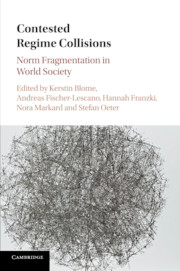Contested collisions
An introduction
Published online by Cambridge University Press: 05 May 2016
- Type
- Chapter
- Information
- Contested Regime CollisionsNorm Fragmentation in World Society, pp. 1 - 18Publisher: Cambridge University PressPrint publication year: 2016



